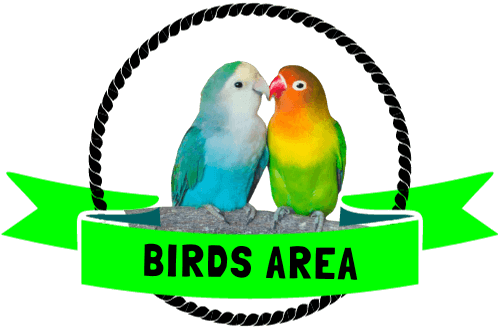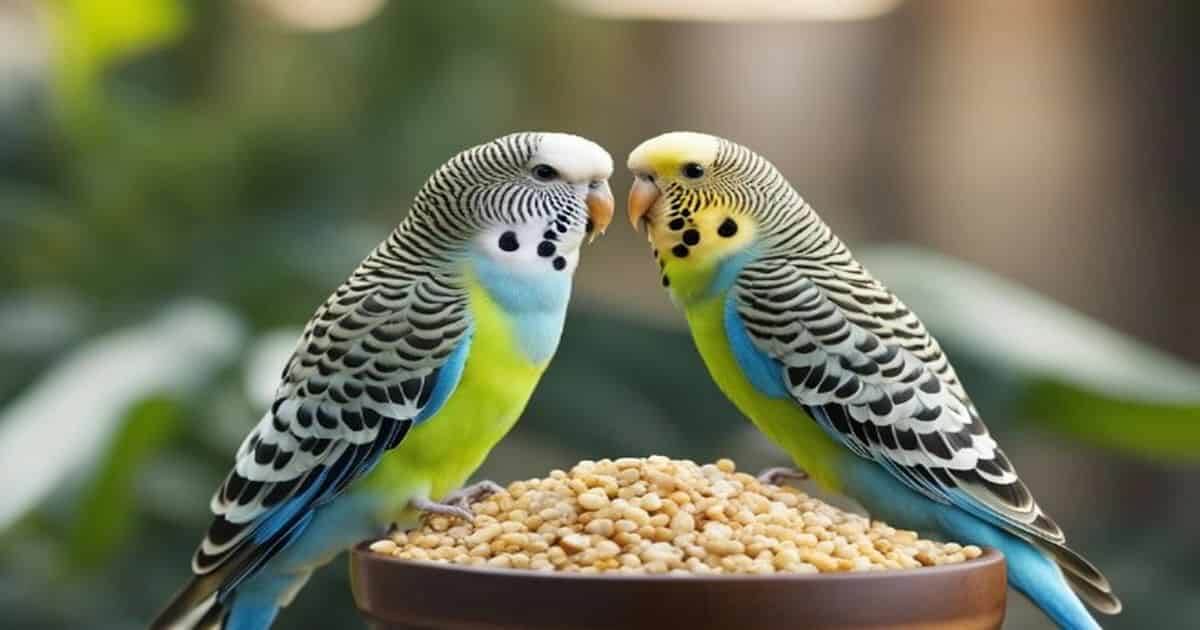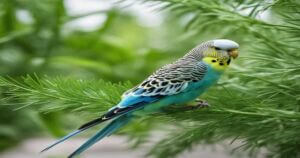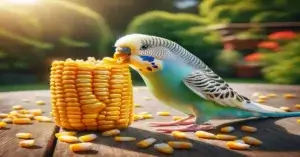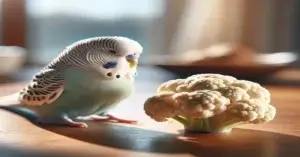Can Budgies Eat Sesame Seeds? Bird Diet Tips & Facts
Hey, bird lover,
Sesame seeds? Yep, these tiny seeds aren’t just tasty for us humans. They’re also a hit with our bird buddies, like the cheerful budgies. Now, you might wonder, “Can my budgies eat sesame seeds?” The answer is a big yes.
Budgies can totally snack on sesame seeds. These seeds are like little health bombs, full of good stuff and fats that budgies need. But, just like treats, you gotta give them in small bits. Too much, and your budgie could get a bit chubby.
Let’s learn all about giving your budgie the best, and sesame seeds are a great addition.
Can Budgies Eat Sesame Seeds? Unveiling the Truth

As a proud budgie owner, I always want what’s best for my feathered friends, ensuring they lead a happy, healthy life. I’ve often explored different foods to enrich their diet, and one option I’ve considered is sesame seeds.
So, can budgies eat sesame seeds? Absolutely, but as with everything, they should be given in moderation due to their high fat content.
Here’s how I’ve successfully incorporated sesame seeds into my budgies’ diet:
1. Moderation Is Crucial
Sesame seeds are nutritious but fatty. I add just a few to my budgies’ food sometimes to avoid health problems like obesity.
2. Always Unsalted
I only give my budgies raw, unsalted sesame seeds. Salted snacks can be dangerous for them.
3. Balanced Diet
I treat my budgies to sesame seeds while ensuring their main diet consists of pellets, fruits, vegetables, and some seeds for varied nutrition.
4. Benefits of Sesame Seeds
Sesame seeds are healthy treats, providing my budgies with calcium and other nutrients, supporting their overall health.
5. Monitoring Health
I watch my budgies closely after giving them sesame seeds. They enjoy them, but I’m ready to contact my vet if something seems off.
6. Hygiene Practices
I keep my budgies’ food fresh and their space clean to prevent illness from spoiled or contaminated food.
In summary, by offering sesame seeds in moderation and maintaining a balanced diet and clean environment, I keep my budgies happy and healthy.
However, it’s important to pay attention to their behavior, diet preferences, and overall health and always be prepared to seek professional advice if needed.
Are Sesame Seeds Safe For Budgies?
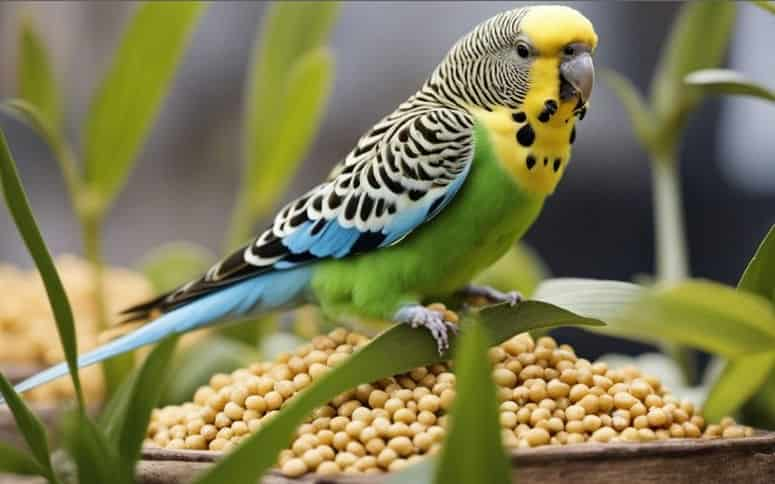
Absolutely, yes, sesame seeds are safe for budgies to eat. Sesame seeds may offer some valuable health benefits for budgies when fed in moderation.
- Essential nutrients: Sesame seeds are rich in essential nutrients like calcium, magnesium, iron, and zinc, which can contribute to your budgie’s overall well-being.
- Healthy fats: Sesame seeds contain beneficial fats, including omega-3 and omega-6 fatty acids, which promote healthy skin and feathers.
- Anti-inflammatory properties: Sesame seeds contain compounds that possess anti-inflammatory properties, potentially supporting your budgie’s immune system.
Are There Any Health Risks Associated With Budgies Eating Sesame Seeds?
Sesame seeds are a nutritious and tasty treat that many budgies enjoy. However, it’s important to consider any potential health risks before incorporating them into your budgie’s diet.
Here are some key points to keep in mind:
1. Obesity and Related Issues
Sesame seeds are high in fat. If budgies consume these seeds in large amounts, they risk becoming obese, which can lead to severe health complications like liver disease and heart problems.
2. Nutritional Imbalance
A diet overly reliant on sesame seeds lacks essential vitamins and minerals, leading to nutritional deficiencies. Budgies thrive on a varied diet, and an excess of sesame seeds can disrupt this balance.
3. Digestive Disruptions
Introducing sesame seeds too quickly or in large quantities can upset a budgie’s digestive system, potentially causing diarrhea or constipation. Gradual introduction and moderation are key.
4. Toxicity Risk
Salted or flavored sesame seeds are hazardous to budgies. The additives in human-grade sesame seeds can be toxic to these birds, necessitating the choice of raw, unsalted varieties for their safety.
5. Spoilage and Mold Danger
Improperly stored sesame seeds can spoil or develop mold, posing a serious health risk. Ensuring seeds are fresh and stored correctly is crucial for the health of your budgies.
6. Choking Hazard
Though less common, there’s a risk of choking if seeds are not fed properly. Monitoring your budgies during feeding times, especially with new food items, is essential.
In summary, while sesame seeds can be part of a budgie’s diet, they require careful handling and moderation. Owners should consult with an avian veterinarian to create a balanced diet and safely introduce new foods like sesame seeds.
How To Prepare And Serve Sesame Seeds For Budgies?
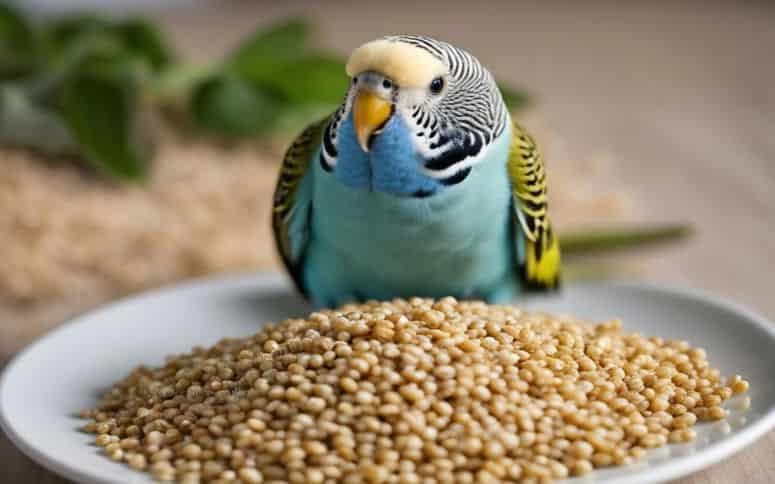
Feeding sesame seeds to your budgies requires careful preparation to ensure their safety and health. Here’s a step-by-step guide on how to prepare and serve sesame seeds to your budgies:
- Purchase Suitable Seeds: Buy raw, organic, and high-quality sesame seeds, ensuring they are free from salt, sugar, preservatives, or any other additives harmful to birds.
- Clean the Seeds: Even though purchased seeds may seem clean, it’s a good practice to rinse them under cold running water to remove dust or potential contaminants. After rinsing, let them air dry thoroughly to prevent mold.
- Portion Control: Due to their high-fat content, sesame seeds should only be a small part of a budgie’s diet. Measure a tiny amount (a pinch or so) to mix with their regular food. A few seeds per bird are more than enough.
- Mix with Other Foods: Combine the sesame seeds with the budgies’ usual seed mix, pellets, or chopped fresh fruit and vegetables. This approach ensures a varied and balanced diet, encouraging the birds to eat a range of nutrients.
- Monitor Your Budgies: When introducing any new food, observe your budgies’ reactions. Look for any signs of digestive discomfort or changes in behavior, appetite, or droppings.
- Regular Feeding Schedule: Sesame seeds should be an occasional treat, not a daily supplement. Offering these seeds once or twice a week is sufficient.
- Clean Up: After feeding, clean out any uneaten seeds from your budgies’ cage to prevent mold and bacterial growth. Regular cleaning is essential for your birds’ health.
If unsure about feeding practices or quantities, consult an avian vet. They can provide guidance based on your budgies’ specific health needs.
How Do I Understand That My Budgie Has Eaten Sesame Seeds Too Much?
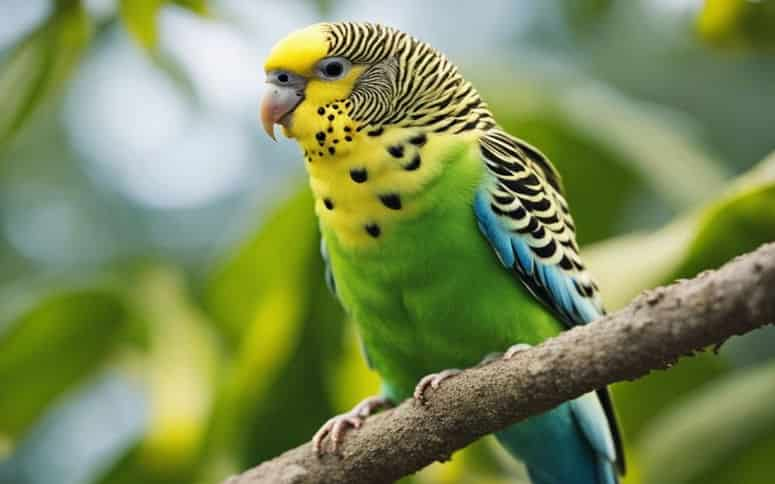
Good signs after a budgie eats sesame seeds include a satisfied appetite, increased energy levels, and healthy feathers. On the other hand, bad reactions may include digestive issues, allergies, or aversion to the taste.
However, it’s essential to be aware of any adverse effects that sesame seeds may have on budgies. Here are some signs to watch out for overeating:
- Diarrhea: Loose or watery droppings could indicate a negative reaction to sesame seeds.
- Vomiting: If your budgie regurgitates food after eating sesame seeds, it could be a sign of intolerance.
- Lethargy: Monitor your budgie for excessive sleepiness or lack of energy, which may suggest an unfavorable response to sesame seeds.
- Loss of appetite: A sudden disinterest in food, including sesame seeds, could indicate a negative reaction in budgies.
- Swelling: Pay attention to any swelling or inflammation around the budgie’s beak or throat area, as it could signal an allergic reaction to sesame seeds.
Can Sesame Seeds Be Combined With Other Foods In A Budgie’s Diet?
Sesame seeds can be a beneficial addition to a budgie’s diet when mixed with other foods, ensuring a balanced nutritional intake. Here’s how:
- Seed Mixes: Add sesame seeds to a mix of millet, flax, and hemp seeds for a nutritious variety. Remember, total seed intake should be a minimal part of their diet.
- Fresh Produce: Sprinkle sesame seeds on chopped fruits or vegetables to encourage consumption of these vital food sources, enhancing their nutrient intake.
- Cooked Meals: Incorporate sesame seeds into cooked bird-safe meals, like mashed boiled eggs with vegetables, for added nutrition.
- Pellet Topping: Sprinkle seeds over pellets to entice picky eaters and add a nutritious surprise to their staple food.
- Foraging Fun: Use sesame seeds in foraging toys with other treats to stimulate mental and physical activity.
In all methods, moderation is key, as sesame seeds are only a supplement to the primary diet of pellets, fruits, and vegetables. Always monitor for any dietary sensitivities and consult a vet as needed.
Can Budgies Eat Roasted Sesame Seeds?
Budgies can eat roasted sesame seeds, but ensure the roasted sesame seeds are free from salt, oils, or any other additives.
Often, commercial roasted sesame seeds prepared for human consumption may contain additional ingredients that can be harmful to budgies.
Even if the roasted seeds are additive-free, they should still be given in moderation due to their higher fat content compared to raw sesame seeds. They should only be a small, occasional treat in a budgie’s diet.
Roasting can alter the nutritional profile of sesame seeds. While they still retain many of their nutrients, some might be reduced due to the roasting process.
Just like raw sesame seeds, roasted seeds, if given in excess, can contribute to obesity and other health issues due to their fat content.
Can Budgies Eat Black Sesame Seeds?
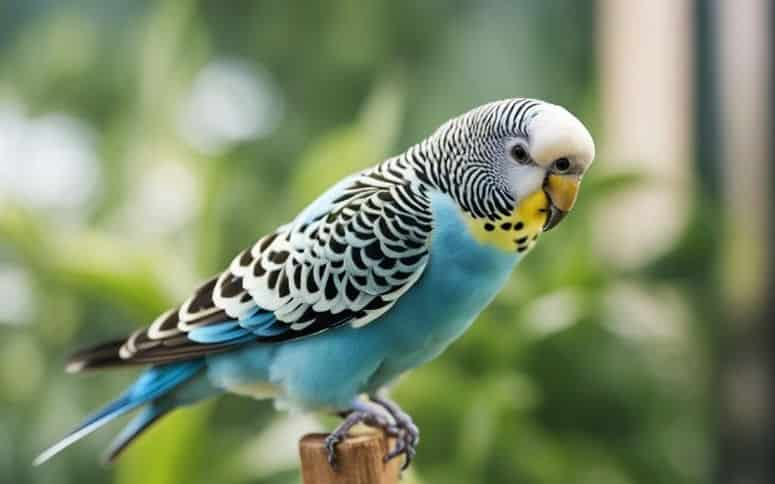
Yes, budgies can eat black sesame seeds, but they must be given thoughtfully and in moderation due to several considerations:
- High Nutritional Value: Black sesame seeds are rich in essential nutrients like calcium and magnesium, beneficial for your budgie’s overall health.
- Fat Content: These seeds have a significant fat content. Overconsumption can lead to health issues such as obesity in budgies, so it’s important to limit their intake.
- Serving Raw: Offer your budgies raw, unsalted black sesame seeds. Many seeds prepared for human consumption have additives, like salt, that are harmful to birds.
- Part of a Balanced Diet: Black sesame seeds should complement a balanced diet of bird-specific pellets, fresh fruits, and vegetables, not replace them.
Always monitor your bird’s reaction to new foods and consult with a veterinarian if any health concerns arise. Responsible and informed feeding is key to maintaining your budgie’s health.
What Are Healthier Alternatives To Sesame Seeds For Budgies?
Here are some healthier alternatives to sesame seeds that can provide your budgie with the necessary nutrients:
- Millet: This small, round grain is a favorite among budgies. It is rich in protein and easily digestible, making it an excellent source of energy for your feathered companion.
- Sunflower Seeds: Sunflower seeds are packed with nutrients like vitamin E and healthy fats. However, they should be given in moderation as they are also high in fat.
- Pumpkin Seeds: These seeds are a good source of protein, fiber, and essential fatty acids. They can be a nutritious addition to your budgie’s diet.
- Quinoa: Quinoa is a gluten-free grain that contains all essential amino acids. It is a complete protein source and provides your budgie with various minerals and vitamins.
- Chia Seeds: Chia seeds are rich in omega-3 fatty acids, fiber, and antioxidants. They can be sprinkled on your budgie’s food to add a nutritional boost.
- Flaxseeds: Flaxseeds are another excellent source of omega-3 fatty acids and fiber. They can promote healthy digestion and a shiny feather coat for your budgie.
- Canary Grass Seeds: These seeds are specifically cultivated for small birds like budgies. They are rich in essential nutrients and mimic the natural diet of budgies in the wild.
Remember, it’s important to introduce new foods gradually and observe how your budgie reacts to them. Every bird is different, so keep an eye out for any signs of allergies or digestive issues.
By offering a variety of healthier alternatives, you can ensure that your budgie receives a well-rounded diet that supports their overall well-being.
Boost your budgie’s health with the ideal seed mix. Watch our expert guide in the video below for tips on crafting the perfect diet.
Which Seeds Can Be Harmful to Budgies?
When it comes to feeding your budgie seeds, it’s like picking sweets for kids – some are great in moderation, while others should be off the menu.
Here’s the lowdown on seeds that are a no-go for your feathered pals:
- Avocado seeds are a big no-no. Actually, the whole avocado is off-limits. It’s toxic to budgies, so best to keep it away.
- Apple seeds might look harmless but they’re sneaky. They have cyanide, which is super bad for birds. So, let’s skip these.
- Fruit pits, like the ones you find in cherries or peaches, are also out. They’re not just toxic but can choke them too.
- And tomato seeds? They’re tricky. The tomato itself might be okay in tiny bits, but its seeds have toxins that aren’t bird-friendly.
So, when you’re thinking about treating your budgie, remember to pick the seeds that keep them chirpy and healthy. Staying away from the no-gos will make sure your feathered friend stays happy and well.
Frequently Asked Questions On Can Budgies Eat Black Sesame Seeds
What Seeds Are Toxic To Budgies?
How Many Seeds Should A Budgie Have A Day?
Final Overviews
Giving sesame seeds to your budgie can be a good move. They’re packed with good stuff that can help keep your bird chirping happily. But remember, don’t go overboard. Too much of a good thing can make your budgie chubby and cause some health problems.
When you’re trying something new on their menu, take it slow. See how your little friend takes to it.
And hey, talking to a vet is always a smart idea. They’ll make sure you’re on the right track for keeping your budgie healthy and happy.
Please share this if you found it helpful. Let’s help everyone keep their budgies in tip-top shape.
